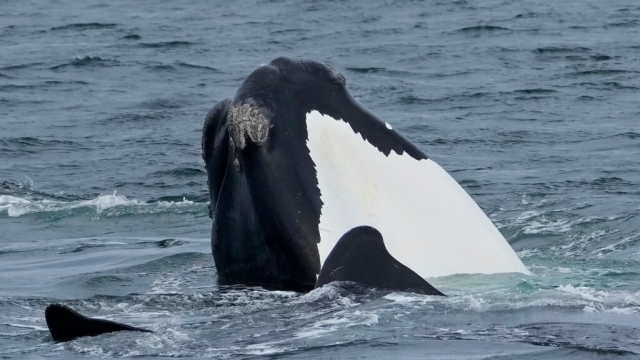Whales continue to wash ashore along the east coast of the United States.
So far in 2023, at least 23 humpback whales have died, including five off the coast of New York and seven in New Jersey.
"Most of the humpback whales we find are killed by either vessel strikes or entanglements," said Alexander Costidis, senior scientist at the Virginia Aquarium's Training Response Program.
The National Oceanic and Atmospheric Administration, or NOAA, has declared it an unusual mortality event.
But with only 40% of the strandings having evidence of human interaction, scientists say discussions over the causes of the deaths have turned political.
Hundreds of activists along the East Coast have rallied against offshore wind farms. They claim the renewable energy projects are responsible for the whale deaths.
"As far as we know, the physics of the sounds being used for surveys are highly unlikely to lead to physical trauma in these animals," said Costidis.
In January, NOAA and the U.S. Bureau of Ocean Energy Management said there was no evidence linking the demise of whales to the wind farms.
In February, the Marine Mammal Commission agreed with those findings.
But in early April, NOAA determined at least one project off the coast of New Jersey "is likely to adversely affect, but is not likely to jeopardize, the continued existence of any species."
SEE MORE: What's causing the unusual strandings and deaths among whales?
U.S. Representatives Jeff Van Drew and Christopher Smith, both New Jersey Republicans, introduced legislation in Congress to halt all offshore wind power projects.
"Certainly, there's a lot of research that should be done. So, there are issues that are important for scientists to study relative to marine mammals and wind farms. This particular issue, which is the whales getting hit and washing up on the beach in New Jersey and in New York and along the mid-Atlantic are really, in my opinion, not wind farm related," said Dave Wiley, research ecologist at Stellwagen Bank National Marine Sanctuary.
Wiley proposes a solution for entanglement and vessel strikes: To get vertical lines out of the water.
"There are technologies that exist that are called on-demand gear, where instead of having the buoys sitting at the surface all the time with a line connecting the gear to the surface ... you only release the buoy when the fisherman wants to retrieve it," said Wiley.
Wiley adds that moving shipping to places with lower concentrations of whales will keep them from getting hit by ships.
"Look at where whales are likely to occur and then move shipping lanes to areas where the whales aren't spending much time," Wiley added.
NOAA Fisheries announced a proposed rule to modify boat and ship speed regulations, expanding mandatory speed restrictions to 10 knots or less in designated areas of the ocean for most vessels 35 to 65 feet in length.
"It's very important because, you know, small vessels have killed right whales, particularly calves," Wiley said.
"You can't save the whale if it doesn't have a healthy environment for it to live in," said Costidis.
These scientists working along the coast agree that to preserve and protect whales, changes have to be made.
"If you love whales, love dolphins, care about any of these animals or really any of the animals on the planet, then try to be thoughtful about how you live," Costidis said.
NOAA says humpback whale deaths have been on the rise on the East Coast since 2016.
Trending stories at Scrippsnews.com



